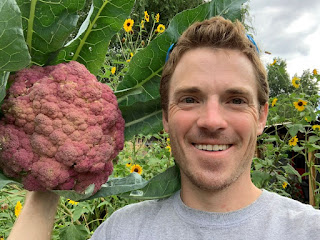Well that's all fine and dandy but why do you grow your own vegetables? Why not just buy them from the grocery store? My local grocery store has plenty of green stuff that I'm told are those fancy "vegetables" you speak of, isn't it the same thing?
Wow, you guys and gals are all pretty loud as you read this blog, I can hear you way over here. That is a great question though so thank you for asking! Yes, your local grocery store likely has plenty of vegetables that are probably pretty reasonably priced. If you take one of these vegetables and put it directly next to the exact same vegetable that I've grown they will probably look identical, the one that I've grown might even look worse than the store bought vegetable! Don't let this scare you and don't judge a book by it's cover. The true test is in the taste, if you do a taste comparison of these vegetables the difference is going to be starkly different despite the fact that it's the same vegetable! Home or locally grown produce is going to have an enjoyable flavor explosion whereas your typical grocery store produce usually tastes like cardboard. The proof is in the pudding as they say.
The general reasoning for this is really quite simple, your store bought produce is from all across the country as well as the world. In order for this produce to be sold from the store before it spoils it's normally picked before it's ripe, boxed up, put in trucks where this food continues to ripen, then sits on the store shelf for a few days or longer before it's bought. The picking before it's ripe keeps precious nutrients out of the vegetable (or fruit) that it needs to keep on developing and ripen properly. Have you ever noticed how vine ripened tomatoes taste quite a bit different and better from other tomatoes that were picked prematurely?
Another factor is the cultivation method, trace-ability, and carbon footprint of this food. It can be very difficult in your typical grocery store to know where the food came from and how it was grown. If you ask the produce stocker they'll usually go in the back and see if they can find a box that says where it came from. There's one very particular instance where I did this in a Sprouts Farmers Market (not to be confused with a real farmers market) and the produce stocker person brought the box out and it literally just said, "Product of U.S.A" with no other information on it, no farm name, no nothing. That narrowed it down quite a bit for me to the very small area that is the United States of America (hopefully you can sense the sarcasm in my typing). The further the food comes from, not only do the chances of that food not tasting good seem to increase, but the carbon footprint on that food is much larger than buying your food locally. This also makes it extremely difficult for you to know how this food was grown. Does this food come from a conventional farm that uses lots of herbicides, insecticides, and pesticides to increase their crop yields and reduce the amount of time that the farmer has to deal with weeds and pests. Or does it come from an organic farm that probably still uses approved organic chemicals to treat their crops? While these organic chemicals are largely touted as being safe, the reality is that there hasn’t been a whole lot of research done on a lot of these chemicals that show their actual effects on the plants, food, land, and what happens when we ingest the remains of these chemicals in the certified organic food. As more research is done though they do suggest that these certified organic chemicals are likely not as safe as once touted. Plus it seems that as time goes on there are more findings of certified organic farms playing the system and defrauding consumers by selling things that don't actually fall under the certified organic label.
My entire point of all of this is that if you buy produce at your typical, everyday grocery store it's probably not going to taste good, it's hard to know where it came from and how it was grown. You pay a premium for certified organic produce but how do you know that the farm it came from isn't defrauding you or if the farm uses approved organic chemicals and if they do, in what quantity? Even if the store is able to tell you where and what farm it came from how do you know that it's a farm that you want to support?
There's an extremely deep (and potentially endless) rabbit hole you can go down with these types of questions that has all sorts of twists and turns to it. I've grown extremely weary of asking these types of questions all the time as there currently really aren't good answers unless you know the farm this food came from or you grew the food yourself.
This is exactly why I've said screw all of this, I'm just going to stop playing with the unknown, do my own thing, and grow as much of my own food as I can (grown how I want to grow my food, as natural as possible) and what I can't grow I'll try and buy from local farms (whenever possible) that I know and I want to support. That way I know the answers to these questions instead of pondering them as I munch on some kale. Plus growing your own food is just plain fun and rewarding!
Purple of Sicily Cauliflower:

No comments:
Post a Comment